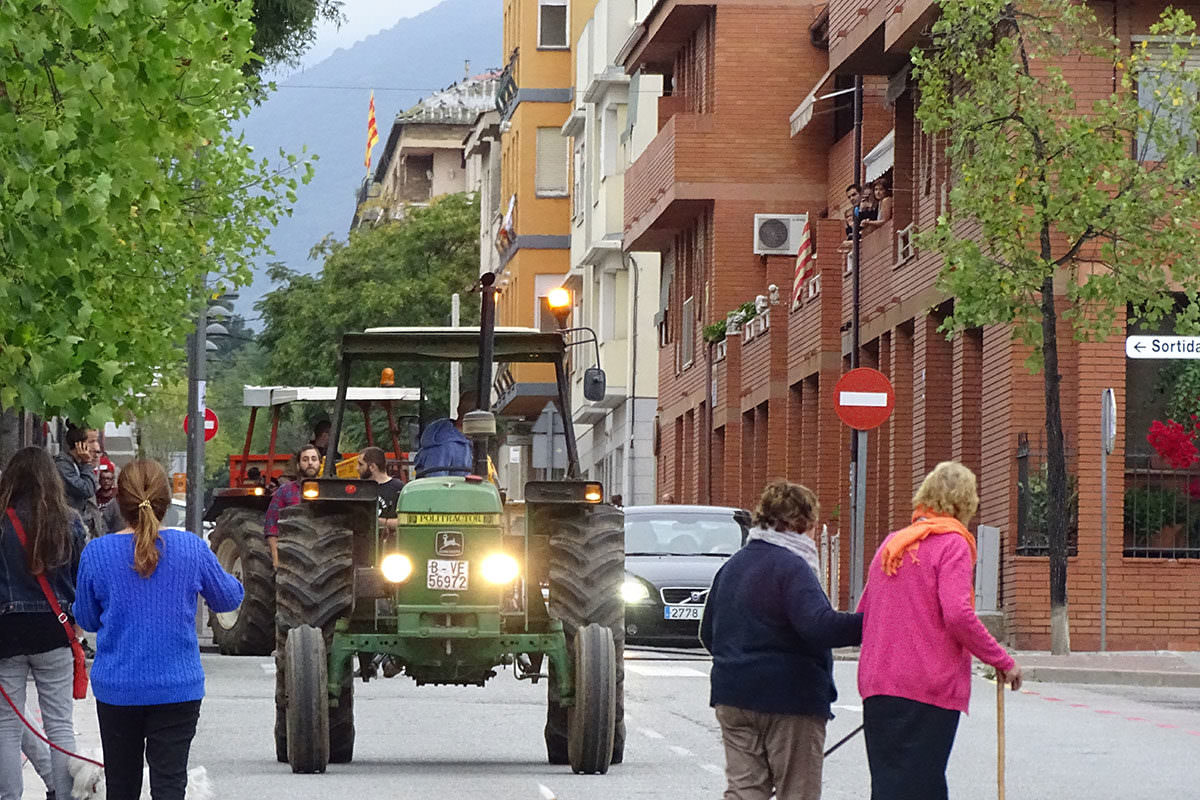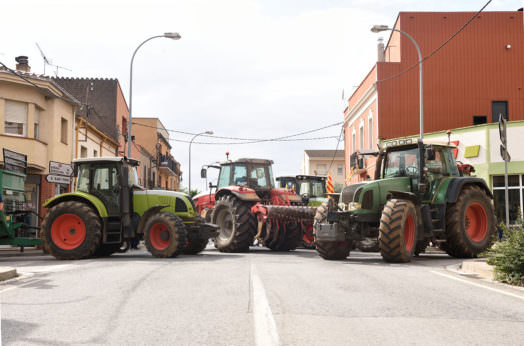Why All the Tractors in Barcelona? Catalonia’s Farmer-Revolutionaries
Lacking tanks, John Deeres are a worthy substitute in times of civil unrest.
Why All the Tractors in Barcelona? Catalonia’s Farmer-Revolutionaries
Lacking tanks, John Deeres are a worthy substitute in times of civil unrest.

Two days before the October 1st vote to determine whether Catalonia should remain part of Spain (a vote that the Spanish government considered illegitimate), an estimated 700 tractors crept into Barcelona, joining a giant parade in solidarity with the independence movement. Assemblea Pagesa, a local farmer’s union, had put out the request: “We ask for all the tractors in the land to be parked in the vicinity of polling stations without hindering traffic or the carrying out of the vote… but ready to move against any potential sabotage of the ballot.”
The role of farmers in the Catalan resistance is explained simply by the importance of agriculture in their society.
The plan was to position the tractors to be used as a blockade against police who had been sent to prevent the vote from taking place. Heeding the call, Catalan farmers acted as a de facto militia – albeit unarmed – their tractors serving as impromptu podiums for young separatists who climbed atop to shout their demands. At a nearby port, farmers reportedly formed a tractor blockade to prevent riot police from disembarking a ship. And throughout the rural interior of the region, “tractoradas” could be seen blocking roads in protest during the tumultuous week following the vote.
“We will break the chains with the sickles,” said one farmer who was interviewed by The Times, referencing a line from the Catalan anthem, Els Segadors, which translates as “The Reapers.”
The song originates from the Reapers War, also known as the Catalan Revolt, a mid-17th century conflict in which the peasants of this heavily agricultural region fought, unsuccessfully, to overthrow the rule of the Spanish crown. Els Segadors is symbolic of the traditional Catalan identity: fiercely proud people of the land, with a strong populist streak.
“Sharpen your sickle! Sharpen your sickle!” the song proclaims. “Just as we cut golden ears of wheat, when the time calls we cut off our chains.”

A Rich Agricultural History
To an extent, the central role of farmers in the Catalan resistance movement is explained simply by the importance of agriculture in Catalan society. Historically, wine, almonds, and olive oil were prized exports, known throughout Europe and abroad. These traditional crops persist today, though production of swine and tree fruits, especially peaches and nectarines, have come to dominate the rural economy. One-third of Catalonia’s landscape is devoted to farms, a hefty percent given the mountainous nature of the area. Compared to the rest of Spain, the economic value of Catalonia’s farms is 80 percent larger.
Another likely reason that Catalonia’s rural areas are a bastion of populist resistance is that they are a bastion of traditional Catalan culture. In Barcelona and other Catalan cities, Spanish is widely spoken, but in the countryside, the various Catalan dialects dominate (Catalan is an ancient language that sounds like a mixture of French and Spanish). The Spanish dictator Francisco Franco effectively banned the language beginning in the 1930s, which was not reversed until 1979. While many affluent urbanites and recent immigrants in Barcelona may see these struggles as something of the past, for rural communities they remain a cause célÁ¨bre.
And A Rich History of Agriculture + Politics
Thus, Catalan farmers are no strangers to political activism. In 2011, a group of pear and apple farmers staged a protest at the French border over a disagreement with their counterparts on the other side of the Pyrenees. Earlier this summer, Catalan peach farmers rode their tractors on a 112-mile “march” to Barcelona in protest of EU agriculture policies that threaten their livelihood, an event that ended with truckloads of rotten fruit being deposited in the streets and eggs hurled at government office buildings.
There is a long history of farmers elsewhere driving into cities atop dusty tractors to make a statement – a “tractorcade” 900-strong descended on Washington D.C. in 1979 – but elsewhere, their ire is usually aimed at agricultural policy, not national politics. But in Catalonia, the two seem to go hand-in-hand.
“This is strangling agriculture, making the farmer poorer and poorer,” said one Catalan farmer to The Washington Post last week, complaining that a disproportionate percentage of subsidy dollars go are doled out to farmers in other parts of Spain. Another Catalan farmer interviewed by The Post, whose family has farmed in the region for ten generations, had this to add about the prospects for farmers should independence be achieved: “Look, the politicians will keep stealing from us, that’s a given, but maybe our own politicians will steal a little less.” Apparently, that’s a lesser evil worth fighting for.
SaveSave
Follow us
This work is licensed under a Creative Commons Attribution-NoDerivatives 4.0 International License.
Want to republish a Modern Farmer story?
We are happy for Modern Farmer stories to be shared, and encourage you to republish our articles for your audience. When doing so, we ask that you follow these guidelines:
Please credit us and our writers
For the author byline, please use “Author Name, Modern Farmer.” At the top of our stories, if on the web, please include this text and link: “This story was originally published by Modern Farmer.”
Please make sure to include a link back to either our home page or the article URL.
At the bottom of the story, please include the following text:
“Modern Farmer is a nonprofit initiative dedicated to raising awareness and catalyzing action at the intersection of food, agriculture, and society. Read more at <link>Modern Farmer</link>.”
Use our widget
We’d like to be able to track our stories, so we ask that if you republish our content, you do so using our widget (located on the left hand side of the article). The HTML code has a built-in tracker that tells us the data and domain where the story was published, as well as view counts.
Check the image requirements
It’s your responsibility to confirm you're licensed to republish images in our articles. Some images, such as those from commercial providers, don't allow their images to be republished without permission or payment. Copyright terms are generally listed in the image caption and attribution. You are welcome to omit our images or substitute with your own. Charts and interactive graphics follow the same rules.
Don’t change too much. Or, ask us first.
Articles must be republished in their entirety. It’s okay to change references to time (“today” to “yesterday”) or location (“Iowa City, IA” to “here”). But please keep everything else the same.
If you feel strongly that a more material edit needs to be made, get in touch with us at [email protected]. We’re happy to discuss it with the original author, but we must have prior approval for changes before publication.
Special cases
Extracts. You may run the first few lines or paragraphs of the article and then say: “Read the full article at Modern Farmer” with a link back to the original article.
Quotes. You may quote authors provided you include a link back to the article URL.
Translations. These require writer approval. To inquire about translation of a Modern Farmer article, contact us at [email protected]
Signed consent / copyright release forms. These are not required, provided you are following these guidelines.
Print. Articles can be republished in print under these same rules, with the exception that you do not need to include the links.
Tag us
When sharing the story on social media, please tag us using the following: - Twitter (@ModFarm) - Facebook (@ModernFarmerMedia) - Instagram (@modfarm)
Use our content respectfully
Modern Farmer is a nonprofit and as such we share our content for free and in good faith in order to reach new audiences. Respectfully,
No selling ads against our stories. It’s okay to put our stories on pages with ads.
Don’t republish our material wholesale, or automatically; you need to select stories to be republished individually.
You have no rights to sell, license, syndicate, or otherwise represent yourself as the authorized owner of our material to any third parties. This means that you cannot actively publish or submit our work for syndication to third party platforms or apps like Apple News or Google News. We understand that publishers cannot fully control when certain third parties automatically summarize or crawl content from publishers’ own sites.
Keep in touch
We want to hear from you if you love Modern Farmer content, have a collaboration idea, or anything else to share. As a nonprofit outlet, we work in service of our community and are always open to comments, feedback, and ideas. Contact us at [email protected].by Brian Barth, Modern Farmer
October 12, 2017
Modern Farmer Weekly
Solutions Hub
Innovations, ideas and inspiration. Actionable solutions for a resilient food system.
ExploreExplore other topics
Share With Us
We want to hear from Modern Farmer readers who have thoughtful commentary, actionable solutions, or helpful ideas to share.
SubmitNecessary cookies are absolutely essential for the website to function properly. This category only includes cookies that ensures basic functionalities and security features of the website. These cookies do not store any personal information.
Any cookies that may not be particularly necessary for the website to function and are used specifically to collect user personal data via analytics, ads, other embedded contents are termed as non-necessary cookies.